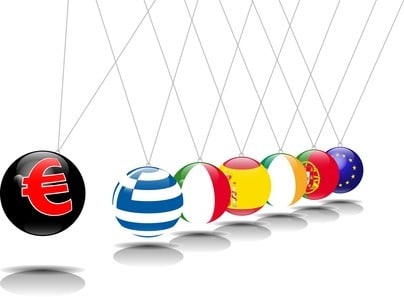Germany refuses to use the unlimited purchase power of the ECB to buy bonds in a significant magnitude that would stop the rapid deterioration of the debt crisis. But now that the bond rout reached its own doors, the economic giant could lift its objection. Is massive euro-printing on the way?
Up to now, Germany felt the European debt crisis through a very limited economic slowdown. The sell off in European bonds just pushed investors to the safety of German benchmark bunds, lowering borrowing costs lower for Europe’s No. 1 economy.
Periphery to Core Flows
The value of the euro dropped as the crisis intensified in recent months, but given the magnitude of fear, the falls weren’t so big, especially when compared to the sell off in global stocks. A lot of money was flowing within Europe: from the periphery to the core.
This periphery widened recently, and went from the PIIGS countries (Portugal, Italy, Ireland, Greece and Spain) all the way to Belgium, France and even the Netherlands and Finland. The last two are countries which have very strong economies and a low level of debt, lower than Germany’s.
Well, Germany could not stay immune for too long: fears that the European recession would weigh on the German economy, together with the carrying most of the bailout fund on its own back and worries of a split in the euro-zone reached Germany.
The benchmark is broken.
Germany fell short of its planned bond auction, but more than a third. While the yield still remains low and Germany is still considered the safest country, this is a big crack in its soundness.
Up to now, Germany has strictly refused to use the European Central Bank in a massive manner to stop the bond sell off.
ECB’s Unlimited Purchase Power
Central banks have the authority to create money. When the situation deteriorated in the US and the UK, the central banks enlarged their balance sheets and bought government bonds. The goal was to lower yields and encourage lending that would help the economy. The ECB didn’t exactly follow this path.
Since May 2010, the ECB has been buying bonds, and this has intensified since August, when the central bank moved also into Italian and Spanish bonds.
But this seems too little, as Spanish yields are above 6.50% and Italian yields passed the “bailout barrier” of 7%. These bond yields immediately affect the primary market as well: Spain paid a dear price in a 10 year bond auction and also in a 3-month auction: 5.1%.
All this action has been sterilized: the ECB drained the money out of the markets. So, the money supply wasn’t changed and therefore added no inflationary pressures. The single mandate of the ECB is to maintain price stability.
Moving from Sterilized to Unsterilized
If the ECB steps up its bond buys, it might not be able to sterilize these bond buys, and will find itself increasing money supply, risking inflation and devaluing the currency, in a US/UK Quantitative Easing program.
Germany is very fearful of inflation after the horrible hyperinflation in the 1920s. In addition, buying government debt by the central bank encourages excessive government spending and moral hazard.
As the mess continued, pressure was growing from France, from other governments and from a rising number of analysts to use the ECB’s unlimited purchase power.
Will Germany Say Yes?
But now, when the bond rout reached Germany, will the German politicians and the German Central Bank change their minds?
This failed German bond auction could open the door to the Euro-zone QE that many have been waiting for. It could help stabilize the debt crisis by keeping debt in control. It would also risk moral hazard, and this would be challenging for the future.
EUR/USD
The pair already lost critical support after the auction, falling off support at 1.3420 -support that held it for many days.
It may lose much more of its value, reaching 1.25 or even the launch price of 1.17 if the ECB stops sterilizing its bond buys and begins printing euros en-masse.
For more on the euro, see the EUR/USD forecast.
Do you think that this marks the beginning of the crash?

